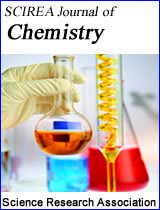SYNTHESIS AND USING OF 10-HYDROXY-3,3,6,6-TETRAMETHY- 9-(2-HYDROXYPHENYL)-1,2,3,4,5,6,7,8,9,10-DECAHYDROACRIDIN-1,8-DION AS ACID BASE TITRATION INDICATOR
DOI: 447 Downloads 15885 Views
Author(s)
Abstract
10-hydroxydecahydryacridinedione derivative was synthesized by the reaction of dimedone, hydroxylamine and salicylaldehyde in dry pyridine. This substance is colorless in acidic and neutral and pink in base solutions. The acid dissociation constant of this compound in a hydroalcoholic solution was determined by the UV-visible spectroscopic technique. It was shown that the obtained compound can be used as an indicator for the titration of strong acids and bases. Titration standard 0.1 n solution of sodium hydroxide with standard 0.1 n solution of hydrochloric acid using of this compound as indicator has been successful
Keywords
10-hydroxydecahydryacridinedione derivative, acid dissociation constant, indicator for the base-acid titration
Cite this paper
Anatoliyi N. Pyrko,
SYNTHESIS AND USING OF 10-HYDROXY-3,3,6,6-TETRAMETHY- 9-(2-HYDROXYPHENYL)-1,2,3,4,5,6,7,8,9,10-DECAHYDROACRIDIN-1,8-DION AS ACID BASE TITRATION INDICATOR
, SCIREA Journal of Chemistry.
Volume 1, Issue 1, October 2016 | PP. 49-56.
References
| [ 1 ] | Safaei-Ghomi J, Ghasemzadeh M.A., Zahedi S. ZnO nanoparticles: a highly efective and readily recyclable catalyst for the one-pot synthesis of 1, 8-dioxodecahydroacridine and dioxooctahydroxanthene derivatives. Journal of the Mexican Chemical Society. 2013, vol. 57, no. 1, pp. 1–7. |
| [ 2 ] | Nakhi A., Srinivas P.V., Rahman M.S. Amberlite IR-120H catalyzed MCR: design, synthesis and crystal structure analysis of 1,8-dioxodecahydroacridines as potential inhibitors of sirtuins. Bioorganic and Medicinal Chemistry Letters. 2013, vol. 23, no.6. pp. 1828–1833. |
| [ 3 ] | Pyrko A.N. Synthesis and Transformations of New 1,2,3,4,5,6,7,8,9,10-Deca- hydroacridine-1,8-dione Derivatives. Russian Journal of Organic Chemistry. 2008, vol. 44, no. 8, pp. 1215–1224. |
| [ 4 ] | 4. Kumar A., Sharma S. A grinding-induced catalyst- and solvent-free synthesis of highly functionalized 1,4-dihydropyridines via a domino multicomponent reaction. Green Chem. 2011, vol. 13, pp. 2017-2020. |
| [ 5 ] | Magerramov, A.M. ; Guseinov, E.Z. ; Akhmedov, I.M. ; Tanyeli, D. ; Kurbanova, M.M. Modified Hantzsch reaction in the presence of chiral organic catalysts. Russian Journal of Organic Chemistry. 2016, vol.52 no.5 , pp.701-705. |
| [ 6 ] | To Q. H., LeeY.R., Kim S.H. Efficient one-pot synthesis of acridinediones by indium(III) triflate-catalyzed reactions of β-enaminones, aldehydes, and cyclic 1,3-dicarbonyls. Bulletin of the Korean Chemical Society. 2012, vol. 33, no. 4, pp. 1170–1176. |
| [ 7 ] | Shchekotikhin Yu.M., Nikolaeva T.G., Shub G.M., Kriven’ko A.P. Synthesis and antibacterial activity of substituted 1,8-dioxodecahydroacridines. Khim.-Farm. Zh. 2001, vol. 35, no. 4, pp. 206 -211. |
| [ 8 ] | Gutsulyak Kh. V., Manzhara M. V., Mel’nik V.S., Kalinc T.I. Relationship between the structure and photostability of decahydroacridine derivatives. J. Appl. Spectr. 2005, vol. 72, no. 4, pp. 488-494. |
| [ 9 ] | Christian, G.D. Analytical chemistry; Wiley, 2003, 848 p. |

